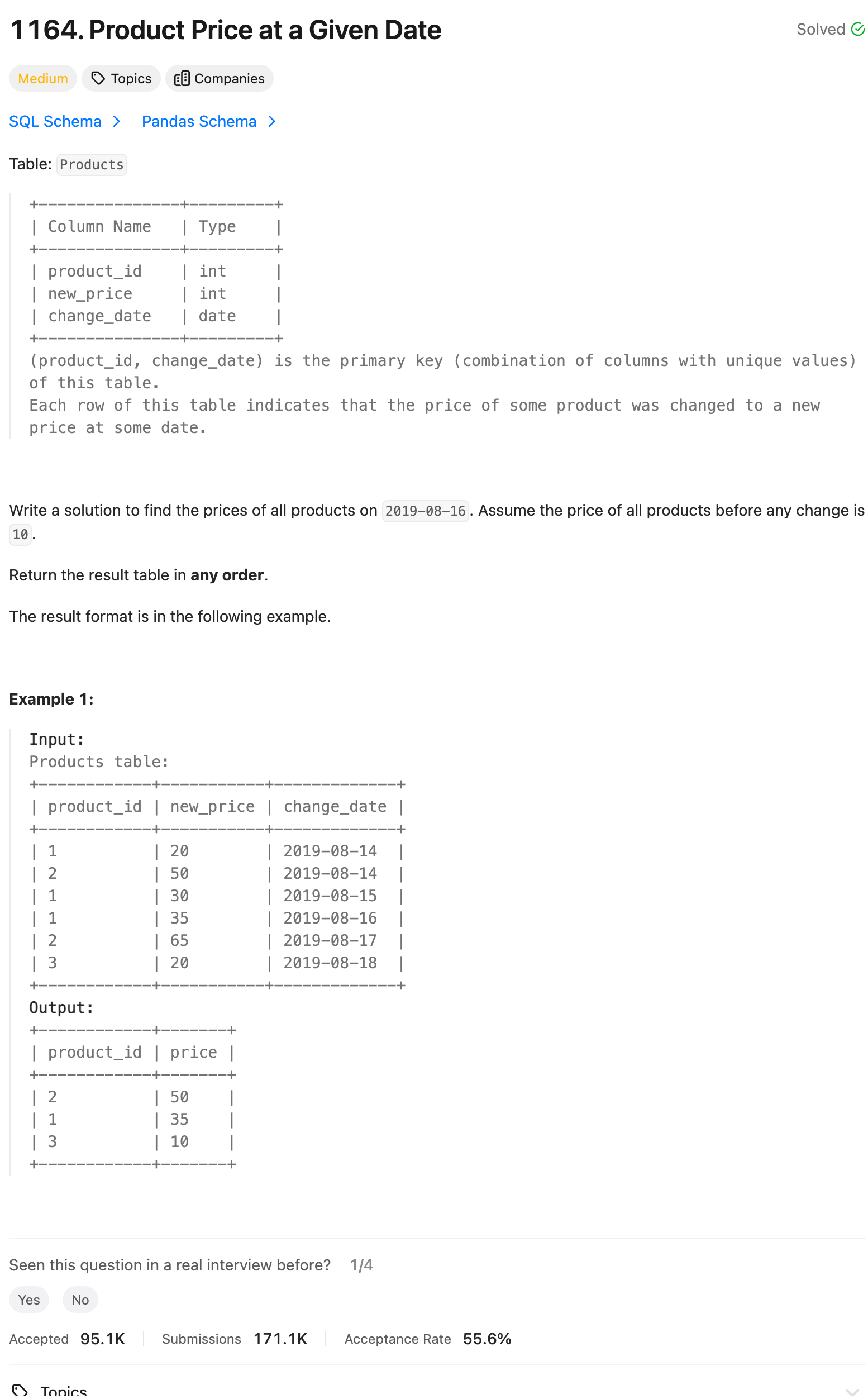SQL problem - Product Price at a Given Date
Problem
Need to review this problem again.
Editorial Solution
Approach 1: Divide cases by using UNION ALL
The main idea of the approach is to divide the cases into two sets using the UNION ALL keyword. The first set includes products where the first changed date (change_date) is after ‘2019-08-16’, and in this case, the new price is set to 10. The second set includes products where the last changed date is on or before ‘2019-08-16’, and the new price is obtained by finding the last changed price for each product.
Here is a step-by-step summary:
-
Group the table by product_id and use the MIN aggregation function with the HAVING clause to find products with the first changed date after ‘2019-08-16’. Set the price to 10 for these products.
-
Group the table by product_id again and find the product_id and the last changed date until ‘2019-08-16’.
-
Find the last changed new_price field with the last changed date for each product.
-
Combine the two sets using UNION ALL.
The approach ensures that there are no duplicate tuples when combining the sets, and it takes into account the cases where the price wasn’t changed in time, setting the new price to 10 in such scenarios. Additionally, UNION ALL is preferred over UNION for better performance since it retains duplicate rows.
SELECT
product_id,
10 AS price
FROM
Products
GROUP BY
product_id
HAVING
MIN(change_date) > '2019-08-16'
UNION ALL
SELECT
product_id,
new_price AS price
FROM
Products
WHERE
(product_id, change_date) IN (
SELECT
product_id,
MAX(change_date)
FROM
Products
WHERE
change_date <= '2019-08-16'
GROUP BY
product_id
)
Approach 2: Divide cases by using LEFT JOIN
SELECT
UniqueProductId.product_id,
IFNULL (LastChangedPrice.new_price, 10) AS price
FROM
(
SELECT DISTINCT
product_id
FROM
Products
) AS UniqueProductIds
LEFT JOIN (
SELECT
Products.product_id,
new_price
FROM
Products
JOIN (
SELECT
product_id,
MAX(change_date) AS change_date
FROM
Products
WHERE
change_date <= "2019-08-16"
GROUP BY
product_id
) AS LastChangedDate USING (product_id, change_date)
GROUP BY
product_id
) AS LastChangedPrice USING (product_id)
Approach 3: Use the window function
Note:
FIRST_VALUE(target field)
OVER (
PARTITION OVER target field -- target field to group
ORDER BY target field -- target field to order
)
The PARTITION BY works the same as GROUP BY. The only difference with GROUP BY is that it produces the result for each row.
SELECT
product_id,
IFNULL (price, 10) AS price
FROM
(
SELECT DISTINCT
product_id
FROM
Products
) AS UniqueProducts
LEFT JOIN (
SELECT DISTINCT
product_id,
FIRST_VALUE (new_price) OVER (
PARTITION BY
product_id
ORDER BY
change_date DESC
) AS price
FROM
Products
WHERE
change_date <= '2019-08-16'
) AS LastChangedPrice USING (product_id);
